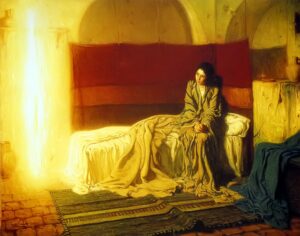Dear all,
In our youth Bible Study last night, we talked about the prophets. There are 15 prophetic books in Hebrew Scripture (called the Nevi’im in Hebrew): the three major prophets of Ezekiel, Jeremiah, and Isaiah (Christians add two more, Lamentations and Daniel), and the minor prophets, consisting of Hosea, Joel, Amos, Obadiah, Jonah, Micah, Nahum, Habakkuk, Zephaniah, Haggai, Zechariah, Malachi. This is a diverse and opinionated cast of characters, who do not shy away from forceful rhetoric, pointed criticism, and extreme behavior to get their points across. Isaiah, for example, walked around naked for three years to make his point – or rather, to make God’s point. Because for each of the prophets, the message they were trying to get across was God’s.
While the prophets each have their own story and style, there are a few things that connect them all. Each has some experience of God, a call. This call leads them into a life focused on mutual partnership between God and God’s people.* This sometimes means calling people to cause when they are not living in mutual partnership with God, when they are not living the way God has called them to. Micah 6:8 offers a pithy summary: “[God] has told you, O mortal, what is good; and what does the Lord require of you but to do justice, and to love kindness, and to walk humbly with your God?”
The prophets frequently accuse Israel of idolatry, of getting too cozy with other gods, and of allowing or enacting injustice towards the vulnerable. After making their accusations, they call on the people to repent, emphasizing more or less God’s merciful nature to those who confess and change their ways. Unfortunately, people being what we are, change is often temporary (shout out to the people of Ninevah for listening to Jonah!). And when change fails to come or is inconsistent, the prophets announce the consequences: the coming judgement of the Day of the Lord, which would real and felt consequences in the world.
This pronouncement of coming judgement was not just far away in the future. Many of the prophets were active during times of exile and occupation of Israel, when their people were suffering, their cities destroyed, and their communities displaced. Announcing the downfall of Jerusalem wasn’t abstract: it happened. Cosmic events were local; local events were cosmic.
Last night as we talked about the prophets, we wondered together about the tension between warning and hope that the prophets offer, and the role prophets still play today. Not only the Biblical prophets but our own contemporary prophets. Greta Thunberg, Malala Yousafzai, Nelson Mandela, and Martin Luther King, Jr. were each offered up as prophetic voices of our time, demanding that we change the way we live together on our planet and with one another, warning of the consequences if we do not, and offering us the possibility of a different future.
As we remember Dr. King’s life and legacy this weekend, I wonder what prophetic voices you are encountering? What are they agitating for? What are they warning against? What hope do they offer? And reflecting on our own lives, how might the prophets call us to live differently? What idols do we worship (power, control, fame, youth, money, and desire were a few we came up with)? What injustice do we tolerate? And how might we be called to do justice, love kindness, and walk humbly with God?
Love,
Rebecca+
*A quick (or not so quick) contextual note: Throughout Hebrew Scripture, or the Old Testament, God’s people are often called the people of Israel, or simply Israel. This gets confusing, since there is also contemporary nation state called Israel. In the Bible, the people of Israel derive their name from Jacob, son of Isaac and Rebecca, son of Abraham and Sarah. When Jacob wrestles with God at the Jabbok river (Genesis 32:22-32), God blesses Jacob and gives him a new name, Israel, which means “one who struggles with God.” Jacob’s twelve sons become the twelve tribes of Israel, who go on to inherit their parents’, grandparents’, and great grandparents’ faith, springing from Abraham’s covenant with God (Genesis 17). In the liturgies of the Episcopal Church today, you may here a phrase like “The calling of Israel to be your people” (Eucharistic Prayer B, Rite II). This is refers to the Biblical people of Israel, tracing their faith through Jacob all the way back to Abraham and Sarah. As Christians, our understanding of what it means to be part of the people of God is different because of Jesus (the arguments about this get thorough treatment in Acts and the Epistles), but we, too, trace our religious family tree back to Genesis.

